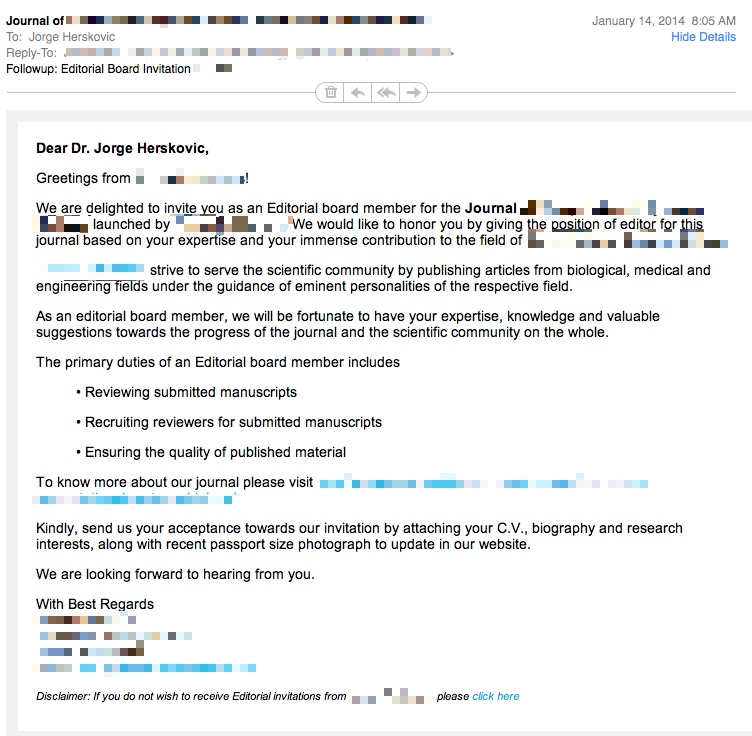Part of being a scientist is curating the work of other scientists. This is called peer review. Peer review is critical to the well-being of science, because it helps ensure that the scientific record is important, correct, and has passed some level of validation before being put in front of other people.
Peer review is unpaid, tedious work. Most Universities know that their faculty will spend some time performing peer review. Official institutional CVs and promotion paperwork therefore have space for review activities, so that you can show you’re contributing to the larger scientific community. It also makes you feel like a good citizen, which it should, since no one will ever thank you for it.
A step above this (and a major time sink) is the -still unpaid- position of editor of a scientific journal. A good editor knows his or her field well, has plenty of experience in the peer review trenches, and performs invaluable service to the scientific community.
Being the editor of a scientific journal, or part of the editorial board, brings some academic bragging rights. It is also somewhat expected (implicitly, of course; no one will ever say this) that your friends and colleagues will want to publish their stuff in your journal. Whether it’s because of the expectation of better service, faster reviews, helping a buddy out, or perhaps a less careful look at the flaws of the science in a paper, is not normally explained.
This post was prompted by an email I get every few weeks. The company, journal, and sender are always different, but the content isn’t.
Where, oh where should I start?
Let’s begin at the bottom. You’d think that being invited to be the editor of a journal, a big honor, merits a personalized email drafted after (one imagines) much careful deliberation. I’d wager that being invited to edit Science, or Nature, or (a bit further down the ladder) our Journal of the American Medical Informatics Association gets you exactly that. No one has invited me to edit any of those, which is probably for the best. I’d be a terrible editor.
Being invited to edit this journal-that-shall-not-be-named comes via spam, with a telltale line at the end giving away that this particular “eminent personality” (me) was picked from a database, and will be invited to edit again by Mail Merge in the future.
Let’s move on to the actual meat of the problem, though. I’ve never published a paper in this field. Ever. My “immense contribution” to the field is exactly ZERO.
What is this, then? It is, like most spam, about money. This is an Open Access journal (fact carefully omitted from the body of the email), which means that scientists will pay publication fees if their papers pass peer review and get published. I strongly suspect that ANY paper sent to this journal will get published, based on their selectivity choosing editors.
It is, then, an offer of a line for my CV (“Editor for the Journal of IMPRESSIVE_SOUNDING_NAME”) and ego service (“Immense contribution!” “Eminent personalities!”) in return for the possibility of guiding some colleague with a paper that can’t-quite-get-published to an unknown Open Access journal edited by his or her buddy. Any paper will do; note that they strive to serve “biological, medical, and engineering fields”. I suspect that a paper on weather patterns in Mars is a-ok too.
I want to be absolutely clear about this: OPEN ACCESS IS A PHENOMENALLY GOOD IDEA. These clowns are polluting, distorting, and corrupting Open Access in the same way that “Barrister BENJAMIN KOFFI, A Legal Representative to late Mr.B A Herskovic” devalues email for everyone else.
Not that it matters, though. As far as I can tell from its website, this journal has never published an article. Nothing in the “current issue”. Nothing in “past issues”. “Articles in press”? Empty. It’s not included in the Journal Citation Reports or Scopus. Not that it should, given that it hasn’t published squat, but I checked for completeness’ sake.
How many editors does this journal that, so far, publishes nothing has on its editorial board? According to its website, twenty-one. It sure seems like a lot of people to edit zero articles, but it’s the only way to get people to consider the journal and get those sweet, juicy Open Access fees flowing.
Ick.

One reply on “You, too, can be an editor!”
I don’t want to live on this planet anymore.